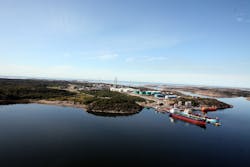Swedish refiner, partner let contract for new complex at Lysekil refinery
Swedish refiner Preem AB, a wholly owned subsidiary of Corral Petroleum Holdings AB (CPH), Stockholm, and US-based project developer Beowulf Energy LLC, New York, have let a contract to McDermott International Inc. to provide front-end engineering design (FEED) for the partners’ previously announced plan to build a residue hydrocracking plant—or residue oil conversion complex (ROCC)—at Preem’s 220,000-b/d refinery in Lysekil, Sweden (OGJ Online, June 15, 2016).
FEED work on the project will begin immediately and is scheduled to be completed during this year's fourth quarter, McDermott said on Jan. 27.
The service provider said it will execute FEED activities for the ROCC from its downstream centers in The Hague and Brno, Czech Republic.
Approval to begin the FEED phase follows an earlier contract award from Preem and Beowulf Energy to the McDermott-Chevron Corp. joint venture Chevron Lummus Global (CLG) to license its proprietary LC-SLURRY technology for a new unit, which would equip the refinery to produce 100% ultralow-sulfur products from its vacuum residue.
McDermott also executed preliminary FEED work for the project.
In its latest available earnings report to investors for second-quarter 2019, CPH said Isabella Lövin—Sweden’s minister of the environment and climate—announced on Aug. 23, 2019, that the government would take over the permissibility application for the Lysekil refinery’s new environmental permit to enable the ROCC project to proceed from the country’s Land and Environmental Supreme Court (LESC). With the judicial process slated to progress as normal with a statement from the LESC due late in the year's first quarter or early in the second quarter, a decision by the government could then come no earlier this year's second quarter.
Following the government’s decision on the new permit, CPH said it will present its plan for the ROCC project to the company’s board for final approval by yearend.
Intended to enable the refinery the upgrade as much heavy oil as possible into sulfur-free gasoline and diesel fuels to help meet rising demand, the ROCC at Lysekil comes amid potential impacts from new rules that require lower sulfur-content specifications for bunker fuels in 2020-25, which will reduce overall market demand for heavy oil, according to Preem and CPH.
Alongside allowing the ROCC project, the new environmental permit for Lysekil is crucial for allowing Preem to change production from fossil-based to renewable products, as the refinery’s existing permit does not permit production of renewable fuels at the site, said Petter Holland, Preem’s president and chief executive officer, in an Oct. 30, 2019, release.
Preem said it intends to eliminate greenhouse gas emissions at both its Lysekil refinery and 125,000-b/d refinery in Gothenburg—at which a new renewable production plant, or green-feed unit, designed to produce about 1 million cu m/year of renewable diesel and aviation fuels is already under way—to become the world's first climate-neutral petroleum and biofuels company with net zero emissions across its entire value chain before 2045. The operator also said it plans to increase its renewable fuel production to 5 million tonnes/year by 2030.
Preem confirmed in 2019 that it also intends to build a full-scale carbon capture plant at the Lysekil refinery to reduce CO2 emissions by one-third by 2025 following a demonstration project at the site that began in 2019 and will run to 2021 (OGJ Online, Mar. 4, 2019).
About the Author
Robert Brelsford
Downstream Editor
Robert Brelsford joined Oil & Gas Journal in October 2013 as downstream technology editor after 8 years as a crude oil price and news reporter on spot crude transactions at the US Gulf Coast, West Coast, Canadian, and Latin American markets. He holds a BA (2000) in English from Rice University and an MS (2003) in education and social policy from Northwestern University.

